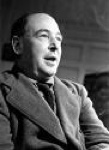 When I began, Christianity came before the great mass of my unbelieving fellow countrymen either in the highly emotional form offered by revivalists or in the unintelligible language of the highly cultured clergymen. Most men were reached by neither. My task was therefore simply that of a translator—one turning Christian doctrine, or what he believed to be such, into the vernacular, into language that unscholarly people would attend to and could understand. –C.S. Lewis
When I began, Christianity came before the great mass of my unbelieving fellow countrymen either in the highly emotional form offered by revivalists or in the unintelligible language of the highly cultured clergymen. Most men were reached by neither. My task was therefore simply that of a translator—one turning Christian doctrine, or what he believed to be such, into the vernacular, into language that unscholarly people would attend to and could understand. –C.S. Lewis
In many ways, I see our role as Lewis does.
Christ-followers are translators. We turn the message of the Kingdom into the vernacular so people can understand it. We do this primarily through our lives. We incarnate the gospel. But, at the same time, we also incarnate the story into words–both spoken and written.
When it comes to writing, few in history excelled C.S. Lewis. Here are some of his thoughts about writing well.
1. Always try to use the language so as to make quite clear what you mean and make sure your sentence couldn’t mean anything else.
2. Always prefer the plain direct word to the long, vague one. Don’t implement promises, but keep them.
3. Never use abstract nouns when concrete ones will do. If you mean “More people died” don’t say “Mortality rose.”
Lewis would have agreed with Dylan Thomas who wrote the following:
Treat words as a craftsmen does his wood or stone, to hew, carve, mold, coil, polish and plane into patterns, sequences, sculptures, figures of sound.
4. In writing, don’t use adjectives which merely tell us how you want us to feel about the thing you are describing.
I mean, instead of telling us a thing was “terrible,” describe it so that we’ll be terrified. Don’t say it was “delightful”; make us say “delightful” when we’ve read the description. You see, all those words (horrifying, wonderful, hideous, exquisite) are only like saying to your readers “Please will you do my job for me.’
5. Always write (and read) with the ear, not the eye. You should hear every sentence you write as if it was being read aloud or spoken. If it does not sound nice, try again.
6. Read all the good books you can, and avoid nearly all magazines.
And then these two for fun:
– Turn off the Radio.
– Don’t use a typewriter. The noise will destroy your sense of rhythm, which still needs years of training.